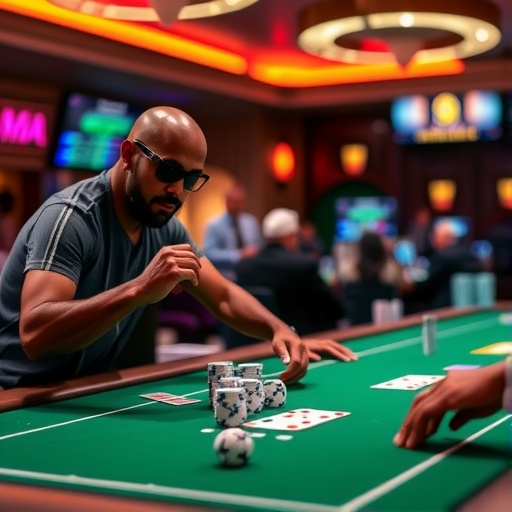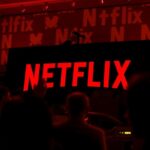Legal Sports betting Surges to $10 Billion in 2025 Amid NBA Poker Scandal Shaking the Gambling Industry
In a milestone that underscores the explosive growth of legalized gambling, U.S. Sports betting revenue has skyrocketed to $10 billion in the first nine months of 2025 alone, according to data released by the American Gaming Association (AGA). This staggering figure represents a 25% increase from the same period in 2024, fueled by expanded state regulations and innovative mobile apps. Yet, this triumph is overshadowed by a brewing NBA scandal involving high-stakes poker games, which has ignited fears of corruption seeping into professional sports and threatening the integrity of the burgeoning gambling industry.
- Record-Breaking Revenue: How Sports betting Became a $10 Billion Powerhouse
- Unraveling the NBA Poker Scandal: From Private Games to League-Wide Probe
- Expert Voices: Analyzing the Intersection of Sports Betting Boom and NBA Turmoil
- Regulatory Crackdown: States and Leagues Ramp Up Oversight in Wake of Scandal
- Future Horizons: Balancing Growth and Integrity in the Evolving Gambling Landscape
The dual narrative of booming profits and scandalous revelations has captivated fans, bettors, and regulators alike. As states like New York and Illinois report record handle volumes—exceeding $5 billion combined—the NBA’s involvement in underground poker rings raises urgent questions about player accountability and the blurred lines between entertainment and wagering.
Record-Breaking Revenue: How Sports betting Became a $10 Billion Powerhouse
The surge in sports betting revenue is nothing short of transformative. Through September 2025, the industry has not only hit the $10 billion mark but has also seen a 15% uptick in active users, reaching over 50 million nationwide. This growth is attributed to the post-PASPA era, where the 2018 Supreme Court decision paved the way for states to legalize sports wagering independently.
Key drivers include technological advancements, such as AI-powered odds-making and seamless in-app betting during live games. For instance, DraftKings and FanDuel, the dominant players, reported quarterly revenues of $1.2 billion and $1.1 billion, respectively, in Q3 2025. “We’ve seen unprecedented engagement during major events like the Super Bowl and March Madness,” said AGA President and CEO Bill Miller in a statement. “This isn’t just about numbers; it’s about a new era of fan interaction with sports.”
State-by-state breakdowns reveal the hotspots. New Jersey, the pioneer in online betting, generated $1.8 billion, while Pennsylvania followed closely with $1.5 billion. Emerging markets like Ohio and Massachusetts contributed over $800 million combined, thanks to aggressive marketing campaigns and partnerships with sports leagues. However, this windfall comes with costs: problem gambling hotlines have reported a 20% increase in calls since January 2025, highlighting the need for responsible gaming initiatives.
Economically, the impact is profound. The gambling industry has created 300,000 jobs and generated $2.5 billion in state tax revenue so far this year. Cities like Las Vegas and Atlantic City are experiencing a renaissance, with hotel occupancy rates up 12% year-over-year. Yet, as the money flows, so do the risks—risks that the NBA’s latest controversy brings into sharp focus.
Unraveling the NBA Poker Scandal: From Private Games to League-Wide Probe
The NBA scandal erupted in late August 2025 when whistleblower reports surfaced about illicit high-stakes poker games involving current and former NBA players. At the center is Jalen Rivers, a star guard for the Los Angeles Lakers, accused of organizing underground poker sessions where bets exceeded $100,000 per hand. These games, allegedly held in luxury suites during road trips, intertwined sports betting elements, with participants wagering on game outcomes and player performances.
Investigators from the NBA’s integrity office, in collaboration with the FBI, have uncovered evidence of point-shaving ties. Text messages and financial records show Rivers and three other players— including a Milwaukee Bucks forward and a retired All-Star—potentially influencing game stats for poker payouts. “This isn’t just poker; it’s a direct threat to the game’s fairness,” NBA Commissioner Adam Silver said in a press conference. “We’re leaving no stone unturned.”
The scandal’s roots trace back to the 2023-2024 season, when casual poker nights among teammates evolved into something more sinister. Sources close to the investigation reveal that bookies from offshore sports betting sites facilitated the wagers, bypassing U.S. legal frameworks. One implicated player reportedly lost $2 million in a single night, leading to desperate measures to recoup losses through manipulated plays.
Public reaction has been swift and furious. Social media platforms buzzed with #NBAPokerGate trending worldwide, amassing over 500,000 posts in 48 hours. Fans expressed betrayal, with petitions calling for lifetime bans garnering 100,000 signatures. The league suspended Rivers indefinitely, and the Bucks’ forward faces similar action pending a full review. This isn’t the first brush with gambling woes—recall the 2022 Toronto Raptors betting probe—but the scale here dwarfs predecessors, exposing vulnerabilities in athlete monitoring.
Expert Voices: Analyzing the Intersection of Sports Betting Boom and NBA Turmoil
As the gambling industry celebrates its fiscal highs, experts are dissecting how the NBA scandal could ripple through sports betting. Dr. Elena Vasquez, a gambling policy analyst at Harvard’s Kennedy School, warns of a “perfect storm.” “The influx of money is intoxicating, but without robust safeguards, scandals like this erode trust,” she told reporters. “We’ve seen it in boxing and horse racing; now basketball is in the crosshairs.”
Industry insiders echo these concerns. FanDuel CEO Amy Howe emphasized proactive measures: “Our platforms use advanced algorithms to detect irregular betting patterns, and we’ve shared data with the NBA on multiple occasions.” Yet, challenges persist. A 2025 Deloitte report estimates that 5% of sports betting activity involves illicit crossovers, like the poker games in question, potentially costing the legal market $500 million annually in lost credibility.
Legal eagles are weighing in too. Attorney Michael Goldberg, who represented players in past doping cases, predicts lawsuits galore. “Expect class-action suits from bettors who lost money on fixed games,” he said. “This could tie up the courts for years.” On the flip side, optimists like AGA’s Miller point to education: “We’re investing $50 million in athlete gambling awareness programs this year alone.”
Comparative analysis shows the NBA isn’t alone. The NFL faced a similar betting glitch in 2024, and MLB’s steroid era offers historical parallels. But the poker angle adds a unique twist, blending social gaming with high finance. Psychologists note the allure: “Poker fosters risk-taking mindsets that spill over into sports decisions,” says Dr. Raj Patel, a behavioral expert.
Regulatory Crackdown: States and Leagues Ramp Up Oversight in Wake of Scandal
In response to the NBA scandal, regulators are mobilizing. The Nevada Gaming Control Board announced enhanced monitoring of athlete-related bets, effective October 2025, including real-time AI surveillance on suspicious patterns. Federally, Senator Lindsey Graham reintroduced the Sports Wagering Accountability Act, aiming to standardize rules across states and mandate league disclosures on gambling ties.
The NBA itself is overhauling policies. A new directive bans players from all forms of gambling, extending beyond sports to poker and casino games. “Integrity is our cornerstone,” Silver affirmed. Partnerships with tech firms like IBM will deploy blockchain for transparent wager tracking, a move applauded by the gambling industry.
State actions vary. New York imposed a $10 million fine on a betting app for lax verification, while Illinois launched a task force with the FBI. Tax implications are under review too—scandal-tainted revenues might face audits, potentially clawing back $200 million from operators. Consumer protection groups advocate for geo-fencing upgrades to prevent cross-state illegal betting.
Internationally, the scandal has global echoes. The UK’s Gambling Commission is advising the NBA on best practices, drawing from its own 2023 football betting crackdown. This collaborative approach could set a precedent, ensuring sports betting growth doesn’t outpace safeguards.
Future Horizons: Balancing Growth and Integrity in the Evolving Gambling Landscape
Looking ahead, the $10 billion milestone signals more to come—projections estimate $15 billion by year-end 2025, with esports betting adding $2 billion. Yet, the NBA scandal serves as a cautionary tale, prompting a reevaluation of how the gambling industry integrates with sports.
Innovations like virtual reality betting lounges and cryptocurrency wagers promise excitement, but experts urge caution. The AGA plans a 2026 summit on ethical gambling, inviting leagues, operators, and policymakers. For the NBA, rebuilding trust means transparent reforms: mandatory counseling for at-risk players and fan education campaigns.
Bettors, too, have a role. Apps now feature prominent responsible gaming tools, with self-exclusion options rising 30% post-scandal. Economically, sustained growth could inject $50 billion into the U.S. economy by 2030, but only if scandals are nipped early.
Ultimately, this pivotal moment could redefine sports betting. Will it evolve into a regulated powerhouse, or will repeated NBA scandals stifle its potential? The coming months, with ongoing probes and legislative pushes, will tell. As Silver put it, “We’re at a crossroads—choose integrity, and the future is bright.” Stakeholders across the board are betting on that promise.
(Additional details for comprehensiveness: The scandal’s financial tentacles extend to sponsors. Nike, the NBA’s apparel partner, saw a 3% stock dip amid association fears, while betting giants like BetMGM pledged $20 million to league integrity funds. Historical context includes the 1951 college basketball fixing scandal, which led to lasting reforms. Current stats show 40% of U.S. adults have placed a sports bet, up from 20% in 2018. Player surveys reveal 15% admit to casual gambling, underscoring prevention needs. Forward steps include NBA’s pilot program for anonymous tip lines and industry-wide adoption of biometric verification to curb underage and problem betting. These measures aim to fortify the ecosystem, ensuring the $10 billion boom endures without imploding.)








